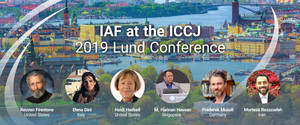Reuven Firestone, United States (chairman)
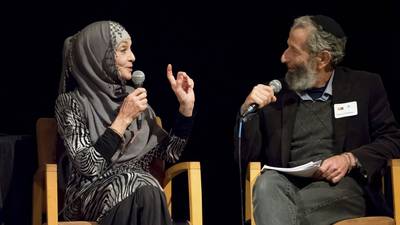
Rabbi Reuven Firestone is the Regenstein Professor in medieval Judaism and Islam at Hebrew Union College, Los Angeles, Affiliate Professor in the University of Southern California School of Religion and senior fellow of USC's Center for Religion and Civic Culture (CRCC). Educated at Antioch College, the Hebrew University in Jerusalem, Hebrew Union College where he received his MA in Hebrew literature in 1980 and Rabbinic Ordination in 1982, he received his Ph.D. in Arabic and Islamic studies at New York University in 1988.
Professor Firestone was awarded the Yad Hanadiv Research Fellowship at the Hebrew University in 1992 for research on holy war in Islamic tradition. In 2000, he was awarded a fellowship for independent research in Jerusalem from the National Endowment for the Humanities for his research on holy war in Judaism, and chosen to be a fellow of the Institute for Advanced Jewish Studies at the University of Pennsylvania in 2002, received the Fulbright CASA III Fellowship at the American University in Cairo for his sabbatical in 2006, and the D.A.A.D. (Deutscher Akademischer Austausch Dienst) grant to teach at the University in Potsdam, Berlin in 2012-2013. He was resident fellow at the Institute for Advanced Catholic Studies at the University of Southern California (fall of 2016), the Sigi Feigel Visiting Professor at the University of Zurich in 2018 and is currently a research fellow of the Alexander von Humboldt Foundation (summers 2017-2019).
Firestone has written over one hundred scholarly articles and eight books. His books and articles have been translated into Hebrew, Arabic, Turkish, Russian, French, Serbian, Czech, Romanian, Albanian, Macedonian, German and Indonesian. He was vice-president of the Association for Jewish Studies, and president of the International Qur’anic Studies Association.
The other members follow in alphabetical order:
Rachel de Boor, Germany
Rachel de Boor lives in Berlin. She works for the European program, Dialogue Perspectives: Discussing Religions and Worldviews, a project of the Jewish scholarship foundation, Ernst Ludwig Ehrlich Studienwerk (ELES). Through Dialogperspektiven, participants from various religious and nonreligious backgrounds enter and form dialogue around topics around religion and society in Europe and worldwide. As part of her work, she also coordinates the newly established Jewish-Muslim think tank, “Karov Qareeb,” which functions as a platform for Jewish and Muslim students in Berlin.
Rachel obtained her MA and BA in Jewish Studies and Religious Science from Potsdam University. She also studied at the Hebrew University and Hebrew Union College in Jerusalem, and the Jewish Theological Seminary in New York, where she focused on Hebrew language, Jewish Feminism, Gender Studies and Liturgy. Her Bachelor Thesis focused on (per)forming (new) rituals within Feminist Jewish Circles. Her Master Thesis treated gender-equal reiterations of liturgical texts, and most specifically the women`s blessing she`asani kirtzono and its alternative versions, as part of the larger question of oral traditions and their transmission within a culture that focuses on the written word.
Both as an academic and activist, Rachel participates regularly in panels and workshops in interreligious and intercultural settings representing queer/feminist/progressive Jewish perspectives. She has been involved in establishing initiatives such as Marom Berlin, Hillel Germany, and Rainbow Havura, volunteers with the Limmud Germany team, and accompanies study trips to Israel. Rachel works occasionally in translation (Hebrew—German), and continues to be involved as a lay activist in a variety of projects and programs in Jewish and interfaith causes.
Elena Dini, Italy
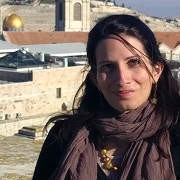
Elena Dini works in the field of communications for religious organizations and she is involved in interreligious dialogue both at the academic and grassroots level.
She is responsible for the interreligious meetings at the Sacred Heart Basilica in Rome within a larger project addressing young refugees and Italians that she represents at the newly launched Network 4 Dialogue gathering European associations working for social inclusion of migrants and refugees. Her academic background is in Near and Middle Eastern Studies with a focus in Modern Trends in Islam; Journalism; Catholic theology; and Interfaith Dialogue. She is a Peacemaking Fellowship Alumna at Hartford Seminary in the USA (2013-2014) and a Russell Berrie Alumna at the Pontifical University of Saint Thomas Aquinas in Italy (2014-2015) for Certificates in Interreligious Dialogue. Elena has taught modules on Islam and on Interfaith Dialogue at different academic institutions and centres.
She works for a Pontifical Institution in the field of communications and she continues her studies in Theology of Religions at the Faculty of Missiology of the Pontifical Gregorian University in Rome. She was the organizer of a training course in Rome for teachers of religion on how to teach religious and cultural diversity (2017) and she is working now on a booklet presenting Experiences of encounter between Jews, Christians and Muslims in the Holy Land.
Heidi Hadsell, United States
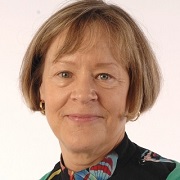
Dr. Heidi Hadsell retired from Hartford Seminary in June 2018, where she served as President, and Professor of Christian Social Ethics for 18 years. Dr. Hadsell went to Hartford Seminary from the World Council of Churches in Geneva, Switzerland where she was the Director of the Ecumenical Institute. Prior to going to the WCC, Dr. Hadsell served on the faculty at McCormick Seminary in Chicago where she taught Christian Social Ethics and served for 4 years as Academic Dean and Vice President of Academic Affairs. Dr. Hadsell also taught for several years at the Federal University of Santa Catarina, in Florianopolis, Brazil.
Dr. Hadsell’s academic and administrative pursuits have consistently focused on the ways in which Christian communities think about and live out, or fail to live out, the moral insights and requirements of the Christian faith. While there are many pressing moral issues and challenges, the focus of Dr. Hadsell’s ethical thought and action over the last 20 years has been on what she considers to be among the most critically important issues of today, which is the construction of mutual relationships with and the building of solidarity between Christian communities and peoples of other faiths, especially Muslims and Jews.
Education:
BA in Political Science, University of California, Berkeley
MA in Comparative Religion, with a concentration in Ethics, Columbia University/Union Theological Seminary
PhD in Christian Ethics, University of Southern California
Mohammad Hannan Hassan, Singapore
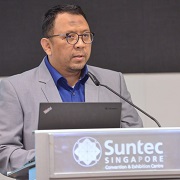
Mohammad Hannan Hassan specializes in the Muslim-Jewish relations, interfaith relations, and history and philosophy of Islamic law in the Malay Archipelago. Under the supervision of the renowned Prof Wael Hallaq & Prof Jamil Ragep , he successfully defended his doctorate dissertation “Islamic Legal Thought and Practices of Seventeenth Century Aceh: Treating the Others,” at the Institute of Islamic Studies, McGill University, Canada.
He received his MA (Islamic Civilization) from the International Institute of Islamic Thought and Civilization (ISTAC), Kuala Lumpur. He holds B.Ed (Hons), First Class with Distinction from Kuwait, majoring in Arabic Language and Islamic education, and was granted Amir of Kuwait Award.
Hannan is actively involved in speaking and presenting papers in seminars and conferences, conducting training and workshops, and organizing summer schools locally and internationally, for youth, teachers, and social activists. His educational contribution extended to countries in North America, Middle East, Australia, and Southeast Asia. He has conceptualized, designed, planned and directed Islamic educational programs (curriculum, syllabi, textbooks, teachers manual, teachers development programs, etc.). He continues to contribute in his lifelong passion for Islamic education, Islamic discourse and intellectual development, in the Islamic Religious Council of Singapore, or Muis, as well as in other NGOs such as the Singapore Islamic Scholars and Religious Teachers Association (Pergas). He is currently the Director for Capacity Building and Interfaith Engagement, and Vice-Dean of the Muis Academy whose primary responsibilities include, among others the promotion of a progressive Islamic learning and discourse, capacity development of religious intelligentsia, strengthening interfaith engagements, and supervision of the Harmony Centre contributing to the development of social cohesion.
Morteza Rezazadeh, Iran
Morteza Rezazadeh is a graduate of the Islamic Seminaries of Qom and is a practicing religious scholar. In addition, he earned an M.A. in Philosophy of Religion from the University of Religions and Denominations in Iran and a second M.A. in Islamic Studies and Christian-Muslim Relations from Hartford Seminary in the United States. He is now a PhD candidate in Comparative Study of Religions and Mysticism at Ferdowsi University of Mashhad, Iran. He teaches in the Islamic seminaries in Qom and Mashhad and also teaches regularly in various forums and universities in Iran and also in Europe and the USA.
Professor Rezazadeh’s publications include papers on religious ethics in Islam, on the role of Mary in early Christianity and Islam, and on Iranian Philology and Culturology. He speaks and writes in Persian, English and Arabic and is active in interfaith programs and peacemaking activities. He is the founder and president of Hikmat International Institute that is an educational and research institution aimed at providing an academic and scholarly ground for religious as well as peacemaking studies and offers courses in different topics related to culture and religion.
CONSULTANT
Frederek Musall, Germany
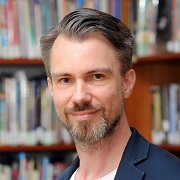
From 1994-2000 Prof. Dr. Frederek Musall studied Jewish Studies, Islamic Studies/Arabic Philology, Semitic Philology, and Comparative Study of Religion in Heidelberg and Jerusalem; PhD thesis on the medieval Jewish thinker Moses Maimonides and Hasday Crescas under supervision of Prof. Dr. Yossef Schwartz (The Cohn Institute for the History and Philosophy of Sciences and Ideas, Tel Aviv University) and Prof. Dr. Raif Georges Khoury (Islamic Studies, Ruprecht-Karls-University of Heidelberg).
Since 2009 he is chair for Jewish Philosophy and Intellectual History at the Heidelberg Center for Jewish Studies and program director of the international M. A. program “Jewish Civilizations” in cooperation with Paideia – The European Institute for Jewish Studies in Stockholm, SWE. He is deputy chairman of the scientific advisory board of and trust lecturer of the Ernst Ludwig Ehrlich Scholarship Fund (ELES) and board member of the scientific Advisory Board for the Institute of Islamic Studies Mannheim (IFIS).
Furthermore he is active various interreligious initiatives, e.g. he is a member of the planning and organizing committee of the Federal Ministry of Education and Research (BMBF)-funded project “Dialogperspektiven: Religionen und Weltanschauungen im Gespräch” of the Ernst Ludwig Ehrlich Scholarship Fund (ELES); executive board member of the Association ‘Jews and Christians’ at the German-Protestant Kirchentag (DEKT); member of the Jewish-Muslim Forum of W. Michael Blumenthal Academy of the Jewish Museum of Berlin; and member of the planning and organizing committee of the “Jüdische-Muslimische Kulturtage” in Heidelberg.

